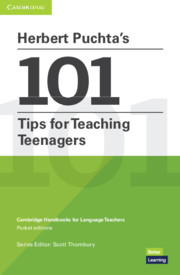 Herbert Puchta's 101 Tips for Teaching Teenagers
Herbert Puchta's 101 Tips for Teaching Teenagers Book contents
Appendix 3 - Habits that Help Create Happiness
Published online by Cambridge University Press: 28 October 2023
Summary
Thinker and writer Richard Whately once said, ‘Lose an hour in the morning, and you’ll spend all day looking for it.’ People arriving late are often stressed and find it difficult to focus. Being on good time makes you confident and allows you to prepare well.
Research shows that the way a conversation starts has a big influence on the way it develops. So, make it a point to begin one by smiling, paying a compliment, finding something to comment positively on. Your partner(s) will feel good, relaxed and creative, and enjoy being with you.
You’re totally involved in an activity. Time flies. You’re focused on reaching your goal. You know you’re making progress. Everything's easy, and you do not allow yourself to be diverted by any distractions. The more you practise this, the easier it becomes, and the more success you have.
Studies show that it's not stress itself that defeats people; it's the fact that they do not take the time needed to recover from stressful phases. Family and friends are important, play sports, have a hobby, sleep enough. And do not constantly think of what you have to do. Relax!
When someone criticises you, don't become defensive. Maybe they want you to improve? Take their feedback seriously. But learn to filter out the feedback that comes from people who want to demoralise you: avoid spending more than the minimum necessary time with them.
One person alone is limited in what they can do. So spend time socialising with people. Join clubs (or form your own), go to student meetings, support campaigns that you think have a good cause etc. This will help you make new friends and meet interesting people who’ll support you when you need them.
Do good for others. When you help someone or volunteer for a job, don't expect to get something for it in return. When you do something good for someone, you will make them happy, and that in turn will make you happy, and ⦠remember that, and be grateful for all the good things in your life!
- Type
- Chapter
- Information
- Herbert Puchta's 101 Tips for Teaching TeenagersCambridge Handbooks for Language Teachers Pocket editions, pp. 113Publisher: Cambridge University PressPrint publication year: 2020
